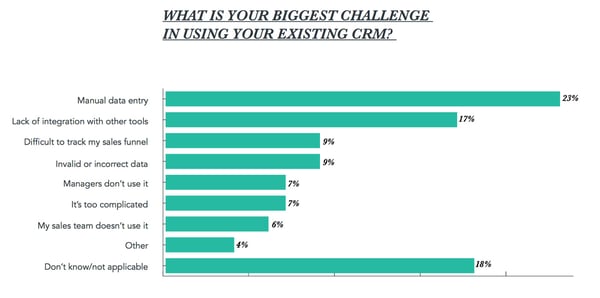Why You Need Integrated CRM

Maintaining long-term relationships with customers is a challenge for B2B companies that has and always will exist, regardless of who your customers are or what you sell to them.
Technological advances have allowed the emergence of solutions like Customer Relationship Management (CRM), designed to provide employees with a tool to more efficiently keep and grow these relationships. While traditional CRM software has removed the need to track customer information on handwritten notes, it still falls short of the goal to "maintain and perfect customer relationships" for one key reason: It lacks integration with customer-specific data sources, like your ERP accounting system and other business applications.
A recent report by Hubspot supports this, and cites the two biggest challenges companies face in using their existing CRM as:
- Manual data entry
- Lack of integration with other tools
What's important to note is that by integrating your CRM with other business applications (including your ERP system) you can cut out most of the manual entry requirements for your employees. This will allow you to gain easier adoption from your employees, alleviate concerns of inaccurate data from entry errors, and see transactional data that otherwise can't be seen without ERP integration.

Source: Hubspot Inbound Report
Make adoption easy for your employees
Investment in software solutions can generate high ROI for companies by making processes more automated (therefore making employees more productive), but nobody is going to use a tool that doesn't make their life easier. Good luck getting adoption across your entire organization if the actual usage of the solution requires more effort on their part. By integrating your CRM with business applications you can automatically populate the platform with accurate and valuable data, empowering your employees to be more productive without any additional work from them.
Ensure you have accurate data
The only thing worse than not having any information is having the wrong information, so if the data used to power your CRM is inaccurate, then you're better not having the solution at all. But when employees are required to manually input high volumes of data, it's impossible not to have some degree of human error. Getting adoption from your employees is only part of the battle, and if your CRM is populated with inaccurate data then adoption is the last thing your organization needs.
Give access to transactional data like orders, payments and quotes
Even if your able to get employee adoption and somehow avoid errors without ERP integration, you are still missing one major component of customer relationships: transactional data. The ultimate goal of any business is to make money; therefore you need solutions that give visibility into orders, payments, quotes and returns.
Your sales reps need visibility into purchasing behavior to identify potential upsell or cross-sell opportunities. Customer service reps can't answer questions about web orders or identify where issues occurred if the CRM doesn't contain enough information. Your accounting team needs the ability to view A/R data (like invoices) or apply payments. Sales managers won’t be able to evaluate effectiveness of their sales teams if performance reporting isn’t there.
The key thing to take away is that implementing a CRM solution can be a great asset for companies but, without integration, you are missing an opportunity to maximize the effectiveness of the solution.





